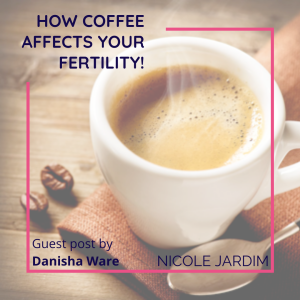Written by my Spring 2017 apprentice, Danisha Ware, this post discusses how caffeine stresses your body and is harmful for your fertility!
What is Caffeine?
Caffeine is known as trimethylxanthine, coffeine, theine, mateine, guaranine, methyltheobromine, and 1,3,7-trimethylxanthine. It is a xanthine alkaloid found naturally in coffee beans, tea, kola nuts, Yerba mate, guarana berries, and cacao beans. For plants, caffeine acts as a natural pesticide since it paralyzes and kills some of the insects that try to feed on the plant.
Caffeine’s Main Actions on the Body
- Stimulates the central nervous system and affects your mood (makes you hyper-alert).
- Stimulates respiratory rate (makes you breathe faster).
- Stimulates the heart rate (makes your heart race).
- Has a mild diuretic effect (makes you need to go to the bathroom).
Caffeine Stresses Your Body
Caffeine is thought to act on the cells in the body by blocking adenosine (an amino acid) receptors. Adenosine, when bound to receptors of nerve cells, slows down nerve cell activity, which also happens during sleep. The resulting increased nerve activity causes the release of adrenaline, which leads to effects such as a higher heart rate, increased blood pressure, increased blood flow to the muscles, decreased blood flow to the skin and inner organs (ovaries), and a release of glucose by the liver. Also, caffeine has a similar action to amphetamines in that it increases levels of the neurotransmitter dopamine in your brain.
Stress is Harmful for Your Fertility
Stress is health’s number one enemy. It ruins your digestive and immune system in the long run leaving your nutrient reserves empty.
How does it do that, you may be wondering?
Stress causes an adrenaline release. This activates your brain and fires up your muscles for fight or flight. It’s fantastic for getting out of dangerous situations quickly, because once you’ve escaped from the danger, your adrenaline plummets and everything goes back to normal.
But it’s terrible for sitting in your chair at the office staring at your IN-tray, wondering how in the world you are ever going to meet your deadline. That sort of stress doesn’t wear off as quickly and can lead to high blood pressure, digestive disorders, frequent colds and flu, and an array of other conditions over the long run—including, you guessed it, infertility.
The effects of stress sound very similar to the effects coffee and caffeine have on the body. According to James D. Lane, Ph.D., associate research professor in the department of psychiatry and behavioral sciences at Duke: “The effects of coffee drinking are long lasting and exaggerate the stress response both in terms of the body’s physiological response in blood pressure elevations and stress hormone levels, but it also magnifies a person’s perception of stress. People haven’t really accepted the fact that there could be a health downside to caffeine consumption, but our evidence—and that of other studies—shows that the downside exists and people should be aware of it in order to make the best possible health choices.”
Drinking Coffee Increases Your Nutrient Need
Because of its diuretic action, coffee leaches key fertility nutrients out of the body. Notably: vitamin C, B vitamins, zinc, calcium, and magnesium. These nutrients are crucial for optimal hormone production and activation as health development of the fetus. Imbalanced hormone levels can lead to ovulatory disorders, poor egg and sperm quality, and miscarriage.
Coffee Decreases Fertility and Increases Miscarriage Risk
A large study from Connecticut found that consuming as little as 1 cup of coffee per day increases the risk of not conceiving by 55 percent! And if you have 2-3 cups per day, that risk rises to 100 percent and continues to increase with an additional cup up to 176 percent.
Did you know that women who drank coffee before and during pregnancy had twice the risk of miscarriage? A study found that 2-3 cups of coffee a day doubles the risk of miscarriage.
Caffeine Can Cross the Placenta and Enter Your Baby’s Bloodstream
The issue here is that the baby is still developing, so his or her organs have not been completed. The baby’s organs cannot cope with the dose of caffeine an adult drinks, leading to cellular and organ damage, retarded growth, low-birth weight babies, premature birth, and an overactive nervous system. The baby is already predisposed to heart problems (irregular heart beats, fast heartbeat and overly excitable heart leading to rhythm abnormalities), and nervous system disorders such as anxiety at birth as a result of exposure to caffeine in-utero.
How Much is Too Much?
Too much caffeine can lead to caffeine intoxication. The symptoms are restlessness, nervousness, excitement, insomnia, flushed face, diuresis (increased urge to go to the bathroom), digestive complaints, and hallucinations.They can occur in some people after as little as 250 mg per day or two standard cups of coffee (one standard cup of coffee contains approximately 150 mg of caffeine). More than 1,000 mg per day may result in muscle twitching, rambling flow of thought and speech, cardiac arrhythmia or tachycardia (irregular or fast heartbeat), and psychomotor agitation (restless leg, eye twitching, or some other excessive muscular activity triggered by stressful thoughts). Caffeine intoxication can lead to symptoms similar to panic disorder and generalized anxiety disorder.
The Withdrawal Effects
Continued consumption of caffeine can lead to tolerance. Upon withdrawal, your body becomes over sensitive to adenosine, causing your blood pressure to drop dramatically, leading to headaches and other negative symptoms. Any accumulated sleep debt will be fully felt during withdrawal as well.
What To Do?
Stop drinking coffee and other caffeinated drinks such as colas, energy drinks, black and green tea and replace them with fresh filtered water, herbal teas, fresh pressed fruit/vegetable juices, and coffee substitutes at least 120 days before conception. However, don’t use decaf coffee, as the chemicals used to filter caffeine are even more toxic to your egg and sperm health. Your local health food store will most likely carry coffee alternatives that may please your palate.
How To Quit Painlessly
If you drink more than one cup of coffee per day, start progressively cutting down by one cup a day until you are only drinking 8 oz per day. Then start making your daily coffee weaker every day. When you are down to ¼ of a teaspoon, stop altogether. For the next three days, you’ll probably be a little bit cranky, headachy, sleepy and craving coffee—this is normal and nothing to worry about.
It may be easiest to stop over the weekend, drink plenty of water, shop for a coffee substitute, get some rest and catch up on your sleep, go for walks in nature, and drink some homemade lemonade with fresh organic lemons and honey. The lemon taste can help stop you from craving coffee and the vitamin C and bioflavonoids will speed up your recovery. By Monday, you’ll physically be over your coffee addiction. By the 21st day after stopping coffee, your psychological addiction will have gone as well.
I know that you can do it for the sake of your fertility, your baby and your general health!
References
https://www.fertilityauthority.com/articles/effects-caffeine-fertility
https://www.verywell.com/caffeine-and-fertility-1960253
https://www.livescience.com/27726-10-things-you-need-to-know-about-coffee.html
About Danisha:
 Danisha Ware is a Fertility Coach and Mercier Therapist. She is the owner of Peaceful Bodies + Bellies located in Cincinnati, OH, where she has worked with hundreds of women who are facing fertility challenges get pregnant. She helps women let go of their limiting beliefs around their fertility as well as to optimize their nutrition, bodies and lifestyle so that they can realize their dreams of becoming a mom and have a happy and healthy pregnancy. To learn more please visit her website.
Danisha Ware is a Fertility Coach and Mercier Therapist. She is the owner of Peaceful Bodies + Bellies located in Cincinnati, OH, where she has worked with hundreds of women who are facing fertility challenges get pregnant. She helps women let go of their limiting beliefs around their fertility as well as to optimize their nutrition, bodies and lifestyle so that they can realize their dreams of becoming a mom and have a happy and healthy pregnancy. To learn more please visit her website.



